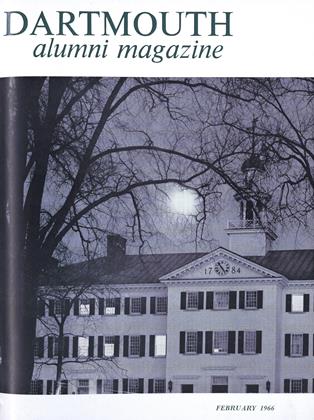COACH Eddie Jeremiah's 300 th hockey victory at Dartmouth . . . some scintillating swimming meets .. . brighter hopes for future success.
Those are the high spots of Dartmouth's winter sports scene which still finds the overall varsity record well below .500.
Jeremiah's coaching career started here in the season of '37-'38, had a three-year lapse during World War II and another one-season break during his Olympic coaching duties of 1964. His 300 th victory came, happily, in the Davis Rink.
It was on January 8 and the opponent was Yale. The victory was momentous not only because it was number 300 but because it provided sweet revenge against the Bulldog.
Yale had been the team which ended Dartmouth's longest winning streak, that 49-game stretch from 1942 to 1946. And the Bulldogs broke it then in the first game Jerry coached after returning from Navy duty.
Yale also was the team which on New Year's Eve of this season, in the first round of the Nichols School Tourney in Buffalo, had drubbed Dartmouth 10-3. The score actually was 3-3 into the final period and then the Elis unleashed a seven-goal barrage. So the fans were not too optimistic when the Green took the ice against the same Yale club here a week later.
But now Jerry's boys were determined. They had secretly acquired a silver plate to be presented to Jerry on the occasion of his 300th. And this time it was Dartmouth which broke a 3-3 tie and roared in with a convincing 6-3 triumph. As Jerry started to leave the coaching box at the final buzzer, his players grabbed him and marched him onto the ice. There Captain Charlie Stuart made a short speech and presented him with the tray as the capacity crowd cheered.
This was the sextet's third straight victory and it got them off to a winning start in Ivy League play. However, a week later Princeton also got some revenge, reversing the 5-4 overtime victory which Dartmouth had scored over it in the consolation round of that Nichols Tourney, and then Harvard poured it on at Cambridge the next Tuesday, 8-3. So it appears the Green hockey team may fall to the seecond division in league standing this season.
In Dartmouth's new pool there was plenty of excitement after the Christmas vacation. The swimming team was keyed up about the" possibility of defeating Harvard for the first time since 1958. The squad was training very hard and morale was high. In the dressing room there were signs such as the one concocted by freshman Tom Solheim of Monoma, Wis., on the GE computer. It read Beat Harvard and was formed entirely of little three-letter figures spelling the word WIN.
But again it was not to be. The Green did not have the depth and sophomore Brad Lindeblad had to be called upon to try a heroic but impossible triple. The young ace rescued the opening medley relay by overcoming a 10-foot deficit on the last leg. But jumping into the 50 freestyle two races later he was too tired to finish better than third and he was in the same spot in the 500 later in the program. The Green wound up winning both relays and eight Dartmouth swimmers posted their best best varsity performances. But Harvard had seven individual victories and won, 53-42.
Lindeblad was the margin of victory in the following meet against a remarkably strong Springfield squad. "He's the clutch guy and he came through for us," said Coach Karl Michael. The Indians went into the final freestyle relay at Springfield, leading by only four points and needing the victory. Lindeblad swam the final 100 in 47.2 and won it by four inches. "Boy, last year we edged Springfield by also winning the final relay that way and the time was 3:25.2. This month we edged them and the time was 3:16, nine seconds better in one year," said Michael.
Prospects are bright for next winter in swimming. The freshmen are undefeated in five meets, including a decisive triumph over Harvard. Captain Carl (Terry) Robinson set a College record and swam the fastest 200 (1:47) in the East this season during that Harvard meet (he is sign-maker Tom Solheim's roommate).
Miler Steve Calvert (D) was only .5 ofa second off the winning pace in theCornell meet in Hanover on January 15.
Chet Halka '69 whose 6'6" against Andover set a freshman highjump record.
Captain Tom Hoober (center) in the 200-yard butterfly, finishing close behindHarvard's Neville Hayes who took a second for Australia in the 1964 Olympics.
 View Full Issue
View Full Issue
More From This Issue
-
 Feature
FeatureThe Antileadership Vaccine
February 1966 By JOHN W. GARDNER -
 Feature
FeatureThe Computer at Dartmouth
February 1966 By John G. Kemeny -
 Feature
FeatureAlumni College Topics Set
February 1966 -
 Feature
FeatureMore Honors for Good Teaching
February 1966 -
 Article
ArticleThe Undergraduate Chair
February 1966 By LARRY GEIGER '66 -
 Class Notes
Class Notes1914
February 1966 By ELMER ROBINSON, CHARLES S. BATCHELDER, MARTIN J. REMSEN








